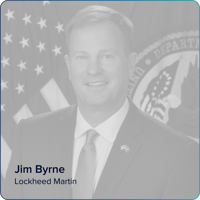What you'll learn on this podcast episode
Artificial intelligence has become the topic du jour—from national news outlets to trade publications. The very term can elicit feelings of uncertainty and dissonance about how it will be applied in our daily lives. One thing is certain: AI will transform the way we do business. With such innovative technology comes the responsibility to use it wisely and ethically. In this episode of the Principled Podcast, host Susan Divers discusses how organizations can approach AI in a responsible and ethical way with Jim Byrne, the vice president for ethics and business conduct at Lockheed Martin.
Where to stream
Be sure to subscribe to the Principled Podcast wherever you get your podcasts.
Guest: Jim Byrne
The Honorable James M. Byrne currently serves as Vice President, Ethics and Business Conduct, for Lockheed Martin Corporation. He is responsible for the strategic direction and operational excellence of Lockheed Martin’s award-winning domestic and international ethics program and execution of the Corporation’s compliance training across the enterprise. Jim is also on the Corporate Artificial Intelligence (AI) Executive Steering Committee and Corporate Vice Presidents Contributions Committee of Lockheed Martin, established and authorized to review and approve large charitable contributions. He previously served as Lockheed Martin’s Chief Privacy Officer and Associate General Counsel leading teams supporting information security, counterintelligence, electronic discovery and records management. Jim also served for several years on the board of directors for Pacific Architects & Engineers (PAE), then a wholly-owned subsidiary of Lockheed Martin.
Jim is a Secretary of the Navy Distinguished Midshipman Graduate of the U.S. Naval Academy, where he received an engineering degree and held the top leadership position of Brigade Commander. He holds a law degree from Stetson University College of Law, where he was awarded a public service fellowship.
In his current role, Jim draws upon his experiences as a deployed Marine Corps combat arms officer, U.S. Department of Justice international narcotics prosecutor, and service at the highest levels of the federal government. He was forward-deployed as an anti-corruption advisor to senior Iraqi officials while leading a team of dedicated and experienced federal law enforcement officers investigating criminal fraud and other misuses of funds supporting the $52B U.S. reconstruction effort in Iraq. Prior to rejoining Lockheed Martin, Jim was nominated by the President and confirmed by the U.S. Senate as General Counsel and then as the 8th Deputy Secretary of Veterans Affairs—the designated chief operating officer of the second largest U.S. cabinet agency.
Jim’s past professional engagements include director and advisory board positions on several startup companies, and service on the U.S. Department of Homeland Security Data Privacy & Integrity Advisory Committee and the International Association of Privacy Professionals Board of Directors (Chairman). He currently serves as a proxy holder–outside board director for Rancher Government Solutions, a subsidiary of FWB: SUSE. Jim is active in his church and community, and prioritizes mentoring veterans. He currently volunteers on the American Association of Suicidology Board of Directors, the Navy–Marine Corps Relief Society Advisory Board, Veterans Moving Forward Board of Directors, Maternal Mental Health Leadership Alliance Board of Directors and the Give an Hour Executive Board of Directors.
Susan Divers is a senior advisor with LRN Corporation. In that capacity, Ms. Divers brings her 30+ years’ accomplishments and experience in the ethics and compliance area to LRN partners and colleagues. This expertise includes building state-of-the-art compliance programs infused with values, designing user-friendly means of engaging and informing employees, fostering an embedded culture of compliance and substantial subject matter expertise in anti-corruption, export controls, sanctions, and other key areas of compliance.
Prior to joining LRN, Mrs. Divers served as AECOM’s Assistant General for Global Ethics & Compliance and Chief Ethics & Compliance Officer. Under her leadership, AECOM’s ethics and compliance program garnered six external awards in recognition of its effectiveness and Mrs. Divers’ thought leadership in the ethics field. In 2011, Mrs. Divers received the AECOM CEO Award of Excellence, which recognized her work in advancing the company’s ethics and compliance program.
Mrs. Divers’ background includes more than thirty years’ experience practicing law in these areas. Before joining AECOM, she worked at SAIC and Lockheed Martin in the international compliance area. Prior to that, she was a partner with the DC office of Sonnenschein, Nath & Rosenthal. She also spent four years in London and is qualified as a Solicitor to the High Court of England and Wales, practicing in the international arena with the law firms of Theodore Goddard & Co. and Herbert Smith & Co. She also served as an attorney in the Office of the Legal Advisor at the Department of State and was a member of the U.S. delegation to the UN working on the first anti-corruption multilateral treaty initiative.
Mrs. Divers is a member of the DC Bar and a graduate of Trinity College, Washington D.C. and of the National Law Center of George Washington University. In 2011, 2012, 2013 and 2014 Ethisphere Magazine listed her as one the “Attorneys Who Matter” in the ethics & compliance area. She is a member of the Advisory Boards of the Rutgers University Center for Ethical Behavior and served as a member of the Board of Directors for the Institute for Practical Training from 2005-2008.
She resides in Northern Virginia and is a frequent speaker, writer and commentator on ethics and compliance topics. Mrs. Divers’ most recent publication is “Balancing Best Practices and Reality in Compliance,” published by Compliance Week in February 2015. In her spare time, she mentors veteran and university students and enjoys outdoor activities.
Principled Podcast transcription
Intro: Welcome to the Principled Podcast brought to you by LRN. The Principled Podcast brings together the collective wisdom on ethics, business and compliance, transformative stories of leadership and inspiring workplace culture. Listen in to discover valuable strategies from our community of business leaders and workplace change makers.
Susan Divers: How do you plan to use artificial intelligence in your business? Is it a friend, foe, or neither? What ethical considerations are at stake? Artificial intelligence has become the topic du jour from national news outlets to trade publications. The very term artificial intelligence can elicit feelings of uncertainty and dissonance about how it will be applied in our daily lives. One thing is certain, AI is here to stay. It will transform the way we do business. With such innovative technology comes the responsibility to use it wisely and ethically.
Hello and welcome to another episode of LRN's Principled Podcast. I'm your host, Susan Divers, Director of Thought Leadership and Best Practices at LRN. Today I'm joined by Jim Byrne, the Vice President for Ethics and Business Conduct at Lockheed Martin. We're going to be talking about AI and how organizations can approach AI in a responsible and ethical manner. I had the pleasure of speaking with Jim on the Principled Podcast last season. He is a veteran Marine and former federal prosecutor with a background that also includes working in Lockheed Martin's legal department for nine years, and recently serving as a Deputy Secretary of the Department of Veterans Affairs. In November, 2021, Jim returned to Lockheed Martin and assumed the ethics and compliance duties. Jim, thanks for your service and welcome back to the Principled Podcast.
Jim Byrne: Thank you, Susan for having me back on your podcast.
Susan Divers: It's a pleasure. Jim, we know that Lockheed Martin has a longstanding and demonstrated commitment to the ethical use of technology. How is the company approaching the development and application of AI?
Jim Byrne: Thanks, Susan, and you are correct. We do have a commitment to the ethical use of technology, and artificial intelligence is no exception. We are continuing to develop trusted artificial intelligence through measured, repeatable and transparent processes. These are complimented by appropriate levels of human oversight and review to ensure we are aligned with the Department of Defense's principles, which include our use of AI being responsible, equitable, traceable, reliable, and governable.
Susan Divers: When we think of these principles, Jim, how do your core values play a role?
Jim Byrne: The ethical use of technology is embedded in our core values, which are do what's right, respect others, and perform with excellence. We believe honesty and integrity in gender trust. Our company abides by United States Laws and the laws in other countries where we do business. With artificial intelligence we have been early adopters of DODs ethical principles, and that being said, AI does raise brand new ethical ambiguities and risks. The DOD principles I mentioned help us address the new challenges and ensure responsible use of artificial intelligence.
Susan Divers: Can you explain a little bit more about the DOD ethical principles?
Jim Byrne: Sure. So Lockheed Martin was actually the first to adopt the USDOD Artificial Intelligence Ethics Principles that were released in February of 2020. The first DOD AI ethical principle is to be responsible, meaning those who are responsible for the development, deployment and use of AI must exercise appropriate levels of judgment and care. The second principle involves the use of artificial intelligence being equitable, meaning that we minimize unintended bias in artificial intelligence capabilities. Third is that the use of AI must be traceable, meaning we must have transparent and auditable methodologies, data sources, and designs and procedures and documentation. Next is that artificial intelligence use is reliable. We must be able to ensure AI capabilities are tested for safety, security, and effectiveness. The fifth principle is that we use artificial intelligence, it must be governable. We must have the ability to detect and avoid unintended consequences with an ability to disengage and deactivate if we find any anomalies.
Susan Divers: Should companies consider having their own internal policies on artificial intelligence, Jim?
Jim Byrne: I think absolutely. Not only did Lockheed Martin adopt the United States Department of Defense's AI Ethical Principles, but we established an internal policy a few months later in September of 2020, aligned with these DOD principles, and we actually named the policy Ethical Development and Use of Artificial Intelligence. Other companies may want to consider attending best practices forums to collaborate and learn more about the ethical application of AI within their industries.
Susan Divers: How do you approach governance when it comes to AI?
Jim Byrne: At Lockheed Martin, we created some strong governance structures, including an artificial intelligence executive steering committee, and importantly, a subcommittee for artificial intelligence ethics. This subcommittee is charted to adjudicate AI ethics concerns. From time to time, employees may have a question or concern about whether an AI program or a component of the program is compliant with policy or aligned with our values. This subcommittee for AI ethics gives them a path to raise concerns and resolve any issues early on.
Susan Divers: You know we have to mention training. How are you communicating the ethical use of AI with your employees?
Jim Byrne: Excellent question. The ethics and business conduct team has actually partnered with our engineering and technology artificial intelligence team to develop the right language to include in our recently updated code of conduct. We also developed an AI consent to use course requiring employees to acknowledge AI policies and guidelines. Early next year, we plan to roll out an AI awareness module for all employees, which will be added to our already existing sensitive information business conduct compliance training course. Then finally, a more granular ethics and AI course will be added to the learning plans in January of 2024 for the specific employees who will be hands-on and most involved with artificial intelligence.
Susan Divers: Can you give us a few nonsensitive examples of applying these principles in practice, Jim? What areas of corporate compliance should be particularly focused on them?
Jim Byrne: On the Homeland Security front, we're currently in the research and development phase of an AI program that will better detect, predict, and fight wildfires. To help ethically train our models, we're using thousands upon thousands of data points from historical wildfires, satellite data, weather patterns, and more. All this information that goes into the model is tracked to ensure traceability. We're continuing to test and refine our models to ensure reliability and governance. To ensure responsibility, everyone working on this program has been trained on the ethical use of artificial intelligence. When it's ready for a customer, our team will ensure that the end user understands the model and how to responsibly use it. If at any point an employee has a concern about this program, they would raise it to the AI Ethics Subcommittee for Adjudication that I referenced earlier. That's a high level example of how we would apply a few of these principles in practice.
Susan Divers: That's a very impressive example, Jim, and thanks for sharing that with us. Jim, this has been such an interesting conversation. Thank you so much for coming on the Principled Podcast, and I hope to see you again here soon.
Jim Byrne: It was my pleasure. Thank you.
Susan Divers: My name is Susan Divers and I want to thank all of you for listening to the Principled Podcast by LRN.
Outro: We hope you enjoyed this episode. The Principled Podcast is brought to you by LRN. At LRN, our mission is to inspire principle performance in global organizations by helping them foster winning ethical cultures, rooted in sustainable values. Please visit us at LRN.com to learn more. And if you enjoyed this episode, subscribe to our podcast on Apple Podcasts, Stitcher, Google Podcasts, or wherever you listen. And don't forget to leave us a review.
Be sure to subscribe to the Principled Podcast wherever you get your podcasts.
















